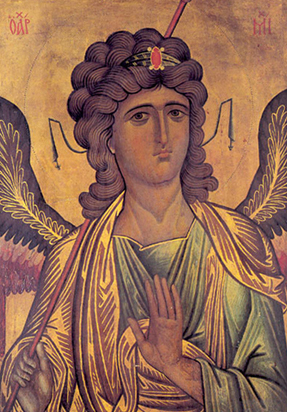Theology
The Holy Apostle Matthew the Evangelist
26. November 2015 - 12:36![]() Matthew, son of Alphaeus, was a tax collector when the Lord saw him in Capernaum and said: Follow Me. And he arose, and followed Him (Matthew 9:9). After that, Matthew prepared a reception for the Lord in his home and thus provided the occasion for the Lord to express several great truths about His coming to earth. After receiving the Holy Spirit, Matthew preached the Gospel to the Parthians, Medes and Ethiopians. In Ethiopia he appointed his follower Plato as bishop, and withdrew to prayerful solitude on a mountain, where the Lord appeared to him. Matthew baptized the wife and the son of the prince of Ethiopia, at which the prince became greatly enraged and dispatched a guard to bring Matthew to him for trial. The soldiers returned to the prince saying that they had heard Matthew’s voice, but could not see him with their eyes. The prince then sent a second guard. When this guard approached the apostle, he shone with a heavenly light so powerful that the soldiers could not look at him; filled with fear, they threw down their weapons and returned. The prince then went himself. Matthew radiated such light that the prince was instantly blinded. However, the holy apostle had a compassionate heart; he prayed to God, and the prince was given back his sight. Unfortunately, he saw only with physical eyes and not spiritual eyes. He arrested Matthew and subjected him to cruel tortures. Twice, a large fire was lighted on his chest, but the power of God preserved him alive and unharmed. Then the apostle prayed to God and gave up his spirit. The prince commanded that the martyr’s body be placed in a lead coffin and thrown into the sea. The saint appeared to Bishop Plato and told him where the coffin bearing his body could be found. The bishop retrieved the coffin with Matthew’s body from the sea. Witnessing this new miracle, the prince was baptized and received the name Matthew. After that, the prince left all the vanity of the world and became a presbyter and served the Church in a God-pleasing way. When Plato died, the Apostle Matthew appeared to the presbyter Matthew and counseled him to accept the episcopacy. He accepted the bishopric and, for many years, was a good shepherd until the Lord called him to His Immortal Kingdom. St. Matthew the Apostle wrote his Gospel in the Aramaic language. It was soon after translated into Greek and the Greek text has come down to us, while the Aramaic text has been lost. It is said of this evangelist that he never ate meat, but only vegetables and fruit.
Matthew, son of Alphaeus, was a tax collector when the Lord saw him in Capernaum and said: Follow Me. And he arose, and followed Him (Matthew 9:9). After that, Matthew prepared a reception for the Lord in his home and thus provided the occasion for the Lord to express several great truths about His coming to earth. After receiving the Holy Spirit, Matthew preached the Gospel to the Parthians, Medes and Ethiopians. In Ethiopia he appointed his follower Plato as bishop, and withdrew to prayerful solitude on a mountain, where the Lord appeared to him. Matthew baptized the wife and the son of the prince of Ethiopia, at which the prince became greatly enraged and dispatched a guard to bring Matthew to him for trial. The soldiers returned to the prince saying that they had heard Matthew’s voice, but could not see him with their eyes. The prince then sent a second guard. When this guard approached the apostle, he shone with a heavenly light so powerful that the soldiers could not look at him; filled with fear, they threw down their weapons and returned. The prince then went himself. Matthew radiated such light that the prince was instantly blinded. However, the holy apostle had a compassionate heart; he prayed to God, and the prince was given back his sight. Unfortunately, he saw only with physical eyes and not spiritual eyes. He arrested Matthew and subjected him to cruel tortures. Twice, a large fire was lighted on his chest, but the power of God preserved him alive and unharmed. Then the apostle prayed to God and gave up his spirit. The prince commanded that the martyr’s body be placed in a lead coffin and thrown into the sea. The saint appeared to Bishop Plato and told him where the coffin bearing his body could be found. The bishop retrieved the coffin with Matthew’s body from the sea. Witnessing this new miracle, the prince was baptized and received the name Matthew. After that, the prince left all the vanity of the world and became a presbyter and served the Church in a God-pleasing way. When Plato died, the Apostle Matthew appeared to the presbyter Matthew and counseled him to accept the episcopacy. He accepted the bishopric and, for many years, was a good shepherd until the Lord called him to His Immortal Kingdom. St. Matthew the Apostle wrote his Gospel in the Aramaic language. It was soon after translated into Greek and the Greek text has come down to us, while the Aramaic text has been lost. It is said of this evangelist that he never ate meat, but only vegetables and fruit.
Source: from Prologue of St. Nikolai Velimirovic
Weekly Diocesan Bulletin - Sunday, November 29, 2015
25. November 2015 - 10:01
Nativity Fast
26TH SUNDAY AFTER PENTECOST:
THE HOLY APOSTLE AND EVANGELIST MATTHEW
RESURRECTIONAL TROPARION - TONE ONE: When the stone had been sealed by the Jews; while the soldiers were guarding Your most pure Body; You arose on the third day, O Savior, granting life to the world. The powers of heaven therefore cried to You, O Giver of Life: Glory to Your Resurrection, O Christ! Glory to Your Kingdom! Glory to Your dispensation, O You who loves mankind.
On Names and Angels. The Day of Archangel Michael
23. November 2015 - 10:51 “There is no one like God”—in this is expressed all of the great Archangel’s knowledge of his God. He doesn’t describe Him, nor does he explain—he stands and witnesses. In this is his inclusion in the radiance of the Divinity, and in this is the measure by which he manifests this radiance and opens for us the way to the Lord’s mystery by his word, and by those names that express all his unfathomable experience of the unfathomable God.
“There is no one like God”—in this is expressed all of the great Archangel’s knowledge of his God. He doesn’t describe Him, nor does he explain—he stands and witnesses. In this is his inclusion in the radiance of the Divinity, and in this is the measure by which he manifests this radiance and opens for us the way to the Lord’s mystery by his word, and by those names that express all his unfathomable experience of the unfathomable God.
There is a place in the book of Revelations where the seer of mysteries, St. John, tells us that when the time comes and we will all be in the Kingdom of God, then each will receive a mystical name by which only God Who gives it knows and recognizes the one who receives it. This name as if contains in itself the whole mystery of the person; by this name is everything said about him; no one can know this name other than God and the one who receives it, because it determines the unique, inimitable relationship that exists between God and His creature—each and every one, and for Him one and only.
Weekly Diocesan Bulletin - Sunday, November 22, 2015
20. November 2015 - 10:4925TH SUNDAY AFTER PENTECOST:
THE HOLY MARTYRS ONESIPHORUS AND PORPHYRIUS; SAINT NECTARIOS, METROPOLITAN OF PENTAPOLIS
RESURRECTIONAL TROPARION - TONE EIGHT: Thou didst descend from on high, O Merciful One! Thou didst accept the three day burial to free us from our sufferings! O Lord, our Life and Resurrection: Glory to Thee!
The Apophatic Quality of Speaking About God
17. November 2015 - 13:30 It is always a good thing, surely, to examine the meanings of the words we speak, but when we speak about God critical reflection is downright imperative.
It is always a good thing, surely, to examine the meanings of the words we speak, but when we speak about God critical reflection is downright imperative.
Take, for instance, the adjectives “eternal” and “infinite,” which for many centuries have been used as descriptive of God. If we spend a minute or so examining these modifiers, it should be obvious that they are not, in our usual sense, descriptive. To declare that God is infinite is not something on the order of saying the soup is hot. Nor is ascribing eternity to God like attributing roundness to a pipe.
Weekly Diocesan Bulletin - Sunday, November 15, 2015
15. November 2015 - 10:39 24TH SUNDAY AFTER PENTECOST: THE HOLY MARTYRS ACINDYNUS, PEGASIUS, AND COMPANIONS
24TH SUNDAY AFTER PENTECOST: THE HOLY MARTYRS ACINDYNUS, PEGASIUS, AND COMPANIONS
RESURRECTIONAL TROPARION - TONE SEVEN: By Thy Cross, Thou didst destroy death! To the thief, Thou didst open Paradise! For the myrrh-bearers, Thou didst change weeping into joy! And Thou didst command Thy disciples, O Christ God, to proclaim that Thou art risen, granting the world great mercy!

